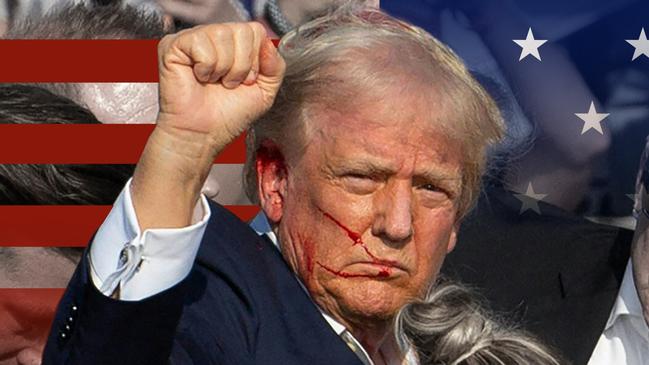Donald Trump’s revolution: Astonishing resurrection reclaims the American dream
Former president Donald Trump leads a cultural movement that is stronger than ever.

With Joe Biden’s presidency now broken, Trump spoke as a candidate anticipating his ascendancy and return to the White House in triumph. Attributing his survival “to the grace of Almighty God” Trump radiated resolve, confidence and an agenda that transcended the ability of a mere mortal leader.
His narcissism is unquenched yet Trump has added a new dimension to his political persona - he now speaks as a unifier and peacemaker, a paradoxical addition to his known identity as a divisive populist.
But there is no denying his power and authority, the loyalty of his dedicated legions and the movement that he leads, best understood as a cultural revolution. America is at a hinge of history moment. Trump spoke to this turning point, aware that his opponents are demoralised and desperate.
He has a double purpose - he seeks to repudiate the progressive legacy of the Biden presidency yet also, somehow, someway, in his post assassination bid moment, repair some of America’s divisions - divisions that he has so ruthlessly exploited.
“The discord and division in our society must be healed,” Trump said. “As Americans we are bound together by a single fate and a shared destiny. We rise together or we fall apart.
“I stand before you this evening with a message of confidence, strength and hope. I am running to be president for all of America, not half of America, because there is no victory in winning for half of America.
“We are one nation under God, indivisible with liberty and justice for all.” Trump’s opponents will choke on this rhetoric. That’s understandable. For years he has divided the country and endangered its democracy. Now he declares himself to be the saviour of American democracy and the agent of its better life.
Trump’s speech had three parts, its opening hymn to unity, his narrative account of how God saved him from assassination - presumably for a higher purpose - and a long denunciation of his opponents and how he will restore the American dream.
He projects as a leader who will thrive in disruption. Trump’s historical reference is the strong man on horseback. He declares the coming election the most important in American history. It is the moment when “we’re going to turn our nation around.” No pledge can be too exaggerated.
Trump says he will end inflation, cut interest rates, reduce taxes, lower energy prices, pay off debt, terminate illegal immigration or what he calls the “invasion” at the border, impose mass deportation of illegals, return law and order to the streets, return patriotism to the schools, get back auto industry jobs, terminate the tax on tips, end the electric vehicle mandate, ban men from women’s sport and impose higher tariffs to protect jobs and enhance built in America.
He has raised expectations beyond the delivery point. Yet Trump knows his supporters - they just want him in office; they are forever loyal and will accept whatever he does.
Above all, his obsession is strength. Herein is the absolute key to his leadership. Strength and perception of strength is everything. “Under our leadership the United States will be respected again,” he told the euphoric convention. “No nation will question our power. No enemy will doubt our might. Our borders will be totally secure. Our economy will soar. We will restore peace, stability and harmony all throughout the world.”
He boasted, yet again, that the wars in Ukraine and the Middle East would never have occurred had he been in the White House. No claim is too outrageous for Trump, yet such claims are the ultimate measure of ambition. How he reconciles in office these myriad contradictions defies prediction.
But Trump comes as an agent of transformation. He understands that these days the orthodox political persona has a limited future. The successful leader must lead a movement and Trump leads a movement.
That movement is a revolution - a revolution of a re-invented, aggressive, conservatism driven by a more empowered Trump, his generational successor, J D Vance and the debacle within the Democratic Party.
Every American political revolution rides on a central idea. The Trump Revolution is about restoration of the American dream – a dream that Trump and Vance assert has been abandoned by an elitist Democratic establishment hooked on progressive ideology, contemptuous of Middle America, tolerant of illegal immigration and undermining the values of family, faith and nation.
One can agree or disagree with Trump’s fantastic claims. But there is no denying the shift in the cultural agenda towards Trump. It is reflected in the polls, the anecdotal mood of America, the chaos of the Democrats and the successful orchestration of the Republican convention that saw the elevation of the youthful and telegenic senator Vance as the vice-presidential candidate with a personal story of the type beloved by Americans and, on the final day, Trump’s nomination acceptance speech that represented a fusion of his old renegade populism and a new brand of plausible presidential status.
Trump’s achievement is remarkable. He has been nominated a third time as the Republican candidate for president – in 2016 when he won, in 2020 when he lost to Biden and in 2024 when he aspires to win again. Only Richard Nixon in Republican history has scored three such nominations.
The point: Trump is not some aberration, as many people in Australia are apt to think. He represents a fundamental part of the American mainstream and leads a cultural movement that’s stronger than ever.
The Republican surge is based on its traditional support – the white, married, free enterprise middle class but supplemented by the Trump Revolution, expressed most simply by Trump in 2021 when he said: “The future of the Republican Party is a party that defends the social, economic and cultural interests and values of working American families of every race, colour and creed.” Like all such movements it is empowered by what it opposes.
The Democrats bear the major responsibility for Trump’s astonishing political resurrection. Beneath Biden’s now exhausted presidency has been an embrace of the political left that generated discontent and waves of anger across America.
The worst mistake the Democrats made was to assume Trump was so discredited that recovery was impossible.
Instead he leads a movement enshrined by its beliefs – that Biden failed to police the southern border; tolerated illegal migrants; promoted identity politics and the social disruption they guaranteed; failed to deliver real wage gains; recklessly promoted inflation; campaigned against fossil fuel industries; disregarded mounting waves of drug addiction, rising violence and theories around race, sex and gender propagated in many school systems; and disrespected the codes of honour and duty around religion, family and parental authority.
Trump and Vance, essentially outsiders to the political system, represent different elements of the revolution – Trump, rich, narcissist and outrageous, believes in shock therapy and threatens the democratic system to get his way, while Vance is deeper, faith-based, more intellectual and a youthful ideological exponent of the “Make America Great Again” credo with the prospect of being its leader in the post-Trump future.
Their team has just been formed. If they win the election – and win big – they have the potential to be a transforming administration. Much depends on whether they seek to govern by division. Their central challenge is obvious – turning their ideological movement, riddled with policy flaws and contradictions, into a viable agenda for government.
In his convention speech Vance focused more on optimism than retribution. He said: “Tonight is a night of hope – a celebration of what America once was and, with God’s grace, what it will soon be again. It is a reminder of the sacred duty we have to preserve the American experiment, to choose a new path for our children and grandchildren.
“For decades, that divide between the few, with their power and comfort in Washington, and the rest of us only widened. As always, America’s ruling class wrote the checks. Communities like mine paid the price. From Iraq to Afghanistan, from the financial crisis to the Great Recession, from open borders to stagnating wages, the people who govern this country have failed and failed again.”
The paradoxes are astonishing. Stripped of his environs and reduced to his core, Vance seems the replication of a 1950s rabid Labor left-winger, calling for more tariffs, attacking financial power, distrusting foreigners, obsessed about protecting industry, demanding higher wages, slamming elites and opposing foreign wars. This is where the US right now stands. What, pray, does this reveal about Trump’s right-wing backers in Australia? Do they grasp what they are supporting?
Yet the cultural touchstones of the changing, self-referencing Trump phenomenon cannot be missed – the values of duty, religion, patriotism and tradition, a movement that embraces the working class, the single mums, battling grandparents and the downtrodden who need a better life, enshrined by its central claim: taking back the American dream.
The Trump movement is taking a new shape that many will be shocked by – it is more inclusive, more about justice, more people-centred, and its attack on the Democratic Party is far more effective.
Might Trump stage a once inconceivable sweep by winning the White House, the House of Representatives and the Senate?
It seems a distinct possibility and it is terrifying the Democratic Party. The pressure on Biden to stand down as the candidate is irresistible. Surely it is only a matter of days. According to reports Biden has been advised to step aside by the elders of the party – former president Barack Obama is pessimistic about Biden’s prospects of beating Trump; former house Speaker Nancy Pelosi has told Biden she doesn’t believe he can win and has shared research data with him; Senate majority leader Chuck Schumer has told Biden that he risks the party losing the Senate; house Democrat leader Hakeem Jeffries has delivered a similar warning; prominent Democratic financial donors have signalled their loss of confidence in Biden.
The Republican convention confirms the image reversal of the parties – the Republicans have the energy, unity, conviction and momentum. There is still time for another twist in this saga before voting day in November, but the Democrats must face a daunting task in redrawing their ticket.
Biden succumbing to Covid may open the door to medical advice. But Biden stepping aside hardly solves the problem. Elevating Harris as the fallback candidate would be largely futile because she almost certainly cannot win.
In truth, the Biden-Harris ticket needs to be swept away and a replacement duo installed, but that is presumably a bridge too far for an identity-bonded party.
Take but one small example this week revealing the nature of the Democratic Party – in California transgender ideology has such a grip that Democrat Governor Gavin Newsom has signed a law that prohibits school districts from requiring teachers to inform parents if a child changes their gender identification.
Every family with school kids is potentially affected – and aware that transgender ideology now takes precedence over parental rights.
Even people who loathe Trump would be tempted to vote for him given such events. In retaliation, Elon Musk says he will move his SpaceX company HQ from California to Texas. “This is the final straw,” Musk wrote on X.
Trump’s policy, by the way, is predictable – threatening to cut funds to schools that promote “transgender insanity”.
By selecting a charismatic generational successor, 39-year-old Vance, as running mate Trump seeks to guarantee the makeover of the Republicans beyond 2028 as the “Make America Great Again” party. While much of Trump’s behaviour has been unacceptable, only a rare historical figure could regain the presidency and also reinvent a political party.
Trump’s nomination speech suggests not that he is a transformed person after a close brush with mortality but that he will shift to a more disciplined and optimistic message. In typical Trump fashion he said beforehand his speech was “a chance to bring the whole country, even the whole world, together”. A softer, more unifying message will merely strengthen Trump’s standing.
By selecting Vance as his vice-presidential running mate, Trump has elevated Vance’s personal story into an inspiring template for his vision of America.
Vance told the convention of his upbringing in a small Ohio town, cast aside by the ruling class, undermined by Biden’s trade deals that destroyed manufacturing jobs and a leadership that went into Iraq – “jobs were sent overseas and our children were sent to war”.
Washington screwed up: “Our country was flooded with cheap Chinese goods, with cheap foreign labour – and in the decades to come, deadly Chinese fentanyl.”
For Vance, the American dream “was becoming a good husband and a good dad” to his wife, Usha, and their three children. He saluted his mother, now “10 years clean and sober”.
He knows how to typecast Biden – “a politician in Washington longer than I’ve been alive” who “for half a century has been the champion of every major policy initiative to make America weaker and poorer”. Vance said that under Trump “we’ll commit to the working man” – that meant “we’re done importing foreign labour, done buying energy from countries that hate us”. New factories would be built, more goods would be “made in the USA” and kids would be sent to war only “when we must”.
Vance is a sophisticated rhetorician who cuts through. A gifted communicator, he may have an impact in the states that matter for the vote – Pennsylvania, Michigan and Wisconsin. His speech was a mix of sentiment and steel: “We love this country and we are united to win.”
Vance invoked the depth of the American compact, saying his cemetery plot was on a mountainside in Kentucky near his family’s ancestral home, his hope being that he and his wife eventually would be laid to rest there by his children, and “our kids will follow us”. Vance’s theme was that America was “not just an idea” but a “homeland” – a homeland we would “fight and die to protect”. It is a concept of home and society that recalls Edmund Burke’s famous formulation of society as “a partnership of the dead, the living and the unborn”.




Inspired by his faith in victory Donald Trump now casts himself as a historical figure of transformation. In his celebratory speech accepting the Republican Party nomination for the presidency Trump offered a bizarre blend of populism and utopianism - pointing to a wild ride for America and the world.